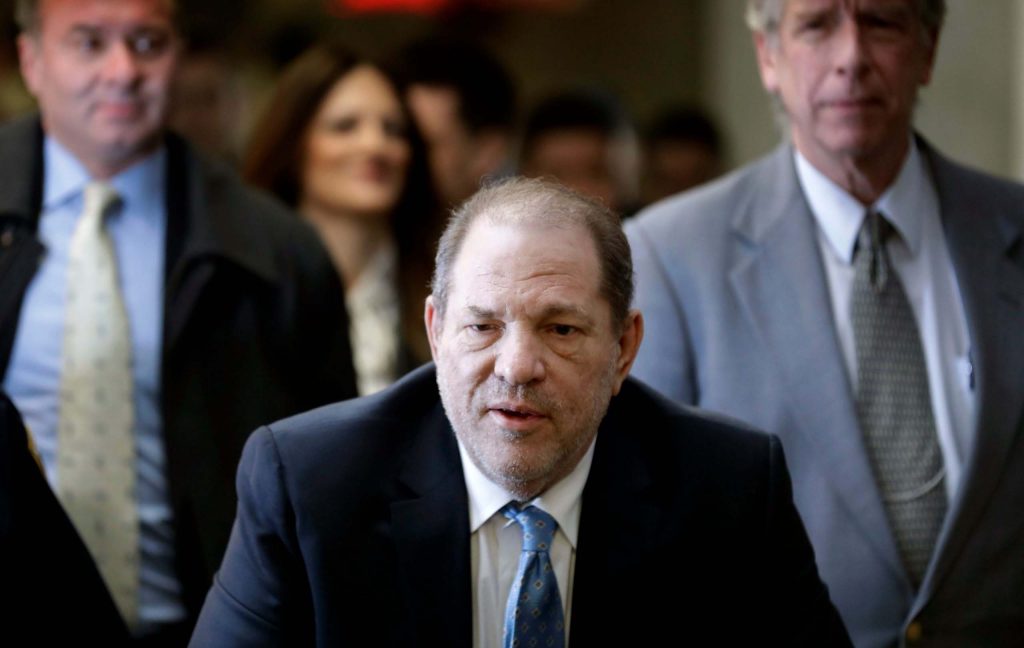New York: Former movie producer Harvey Weinstein was sentenced to 23 years in prison Wednesday following his sexual assault and rape conviction last month in a case hailed as a victory for the #MeToo movement against sexual misconduct.
The sentence was handed down in the Manhattan criminal court by Justice James Burke, who presided over Weinstein’s trial. A jury on February 24 found Weinstein, 67, guilty of sexually assaulting former production assistant Mimi Haleyi and raping former aspiring actress Jessica Mann. Once one of Hollywood’s most influential producers, Weinstein had faced the possibility of a maximum sentence of 29 years in prison.
During the sentencing hearing, prosecutor Joan Illuzzi asked Burke to impose 25 years or ‘near’ 25 years in prison for his conviction on a charge of criminal sexual act in the first degree involving Haleyi and to impose a consecutive sentence for the third-degree rape conviction involving Mann. That charge called for up to four years in prison, but the prosecution made no specific request.
Weinstein, wearing a suit, and the six women who testified against Weinstein were in court for the proceedings.
In an emotional statement in court, Haleyi spoke of the trauma she had endured since the attack and said, “It gave me a scar deeply, mentally and emotionally, perhaps irreparably, perhaps forever.”
Prosecutors in court filings last week said the sentence should reflect not only the crimes of which Weinstein was convicted, but a ‘lifetime of abuse towards others’.
More than 100 women, including famous actresses, have accused Weinstein of sexual misconduct stretching back decades, fuelling the #MeToo movement against sexual abuse and harassment. Weinstein has denied the allegations and said that any sex was consensual.
The jury of seven men and five women acquitted Weinstein on the most serious charges, a single count of first-degree rape as well as two counts of predatory sexual assault, which carried a potential life sentence. Those charges relied on testimony by actress Annabella Sciorra, who said Weinstein raped her in the early 1990s.
Weinstein’s lawyers Monday urged Burke to impose the minimum possible sentence of five years, asking him to consider Weinstein’s charitable activities while saying a longer sentence would likely mean Weinstein would die in prison. “His life story, his accomplishments, and struggles are simply remarkable and should not be disregarded in total because of the jury’s verdict,” they said.
Weinstein has been awaiting sentencing in New York’s Rikers Island jail, where he was moved last Thursday after a 10-day hospital stay at Bellevue Hospital where he underwent a procedure to clear a heart blockage. He was a powerful figure in Hollywood and a contributor to Democratic candidates. He won an Academy Award for producing Shakespeare in Love and was responsible for other acclaimed films including Pulp Fiction, The English Patient and Gangs of New York.
Prosecutors portrayed Weinstein as a serial predator who had manipulated women with promises of career advancement in Hollywood, coaxing them to hotel rooms or private apartments and then overpowering and violently attacking them.
Haleyi testified at the trial that Weinstein invited her to his home in 2006 after she had worked on one of his television productions, backed her into a bedroom, held her down on the bed and forced himself on her orally.
Mann told jurors that Weinstein raped her in a Manhattan hotel room in March 2013, about a month into what she described as an ‘extremely degrading’ relationship with him that continued for several years after the attack. Mann called Weinstein a ‘Jekyll and Hyde’ character, charming in public but prone to rage when they were alone.
Agencies
